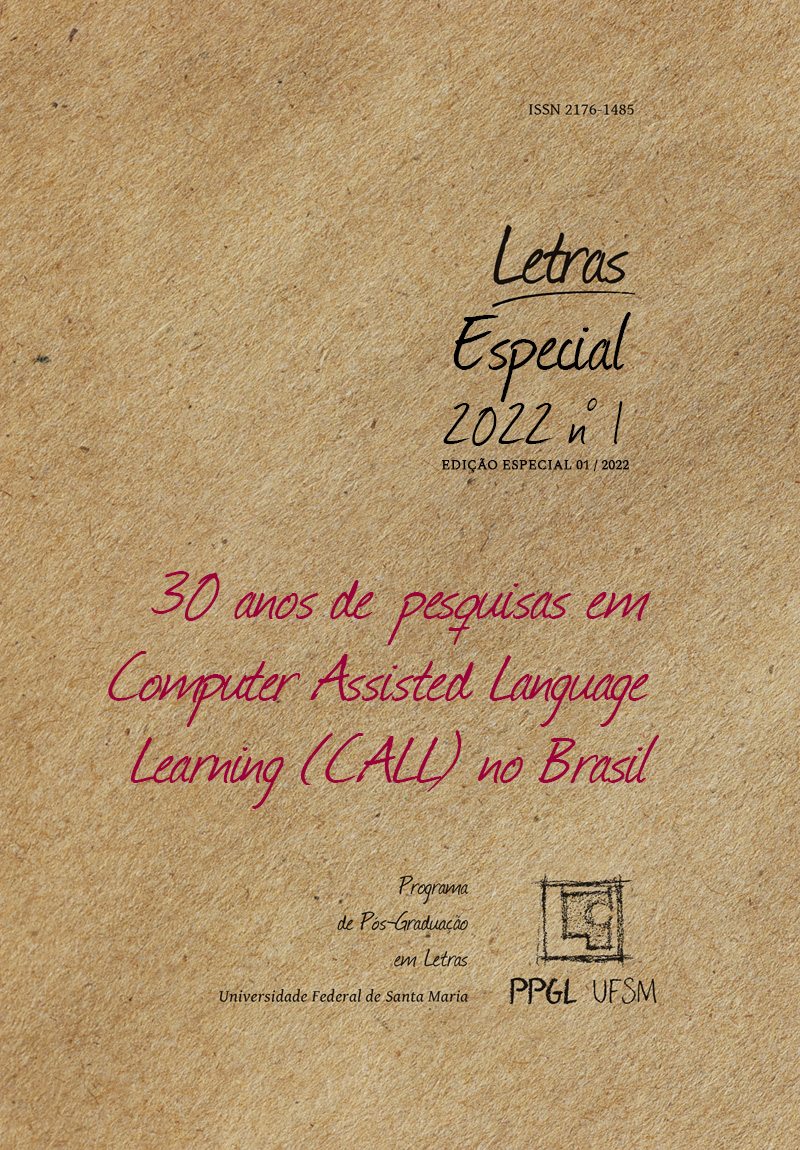Technology-mediated task-based learning: creating affordances for English language development in digital intercultural encounters
DOI:
https://doi.org/10.5902/2176148570774Keywords:
Affordances, Intercultural encounters, Technology-mediated Task-based Learning, Complexity ESLAbstract
This study investigates affordances provided by Technology-Mediated Task-Based Learning (TBL) for language development in an online English as a Second Language class with multinational students in a US university context. From a complexity perspective, this study analyzes whether Technology-Mediated TBL helps build trust and confidence among learners enhancing intercultural and symbolic awareness. We used a netnographic methodology, adapting ethnography to include the influence of the internet in technology-mediated environments. Findings showed that Technology-Mediated TBL provides conditions for intercultural encounters. The task cycle allows the emergence of affordances for learners to build confidence and trust while engaged in language development practices.
Downloads
References
BARON, N. S. See you online: gender issues in college students use of instant messaging. Journal of Language and Social Psychology, n. 23(4), p. 397–423, 2004.
BRASIL Edital MEC nº 29/2017. Chamada pública para recredenciamento de universidades federais para atuação como núcleo de línguas (NUCLI-ISF) No Âmbito Do Programa Idiomas Sem Fronteiras (ISF). 2017. Disponível em: http://isf.mec.gov.br/images/2017/Edital_29_2017.pdf>. Acesso em: 31 março de 2021.
BYRAM, M. S. Teaching and Assessing Intercultural Communicative Competence. Clevedon: Multilingual Matters, 1997.
BYRAM, M.S. NICHOLS, A. STEVENS, D. Developing Intercultural Competence in Practice. Clevedon: Multilingual Matters, 2001.
CANALE, M. From Communicative competence to communicative language pedagogy. In: Richard, J & Schmidt, R (org.) Language and Communication. London: Longman, 1993, p. 2-14.
CANALE, M. & SWAIN, M. Theoretical bases of communicative approaches to second language teaching and testing. Applied Linguistics, n. 1(1), p. 1-47, 1980.
CHUN, D., SMITH, B., & KERN, R. Technology in Language Use, Language Teaching, and Language Learning. Modern Language Journal, n. 100(1), p. 64–80, 2016.
DE BOT, K., & LARSEN-FREEMAN, D. Researching SLD from a DST perspective. In: M. Verspoor, K. de Bot, & W. Lowie (Eds.), A Dynamic Approach to Second Language Development. Amsterdam: John Benjamins Publishing Company, 2011, p. 5–23.
ELLIS, R.; SKEHAN, P.; LI, S.; SHINTANI, S.; LAMBERT, G.Task-Based Language Teaching Theory and Practice. Cambridge. Cambridge Applied Linguistics, 2019.
GLEICK, J. Chaos. Making a new Science. Penguin Books, 1987.
GONZÁLEZ-LLORET, M., & Ortega, L. Towards technology-mediated TBLT: An introduction. In: Technology-mediated TBLT Researching Technology and Tasks. Amsterdam: John Benjamins Publishing, 2014, p. 23-50.
GONZÁLEZ-LLORET, M. Technology and Task-Based Language Teaching In: THORNE, S; MAY, S. (Ed.). Language, Education and Technology. Auckland: Springer International Publishing, 2017, p. 193–205.
FEIJÓ-QUADRADO, C. G.; VETROMILLE-CASTRO, R. Formação Inicial de professores de língua(gem): análise de projeto pedagógico e articulação com as dificuldades emergentes da pandemia de Covid-19. Revista Antares: Letras e Humanidades, V. 14, p.104-136, 2022.
KENNING, M. M. ICT and Language Learning: From Print to the Mobile Phone. New York: Palgrave Macmillan, 2007.
KOZINETS, R. Netnography: Doing Ethnography Research Online. Sage Publications, 2010.
KRAMSCH, C. Context and Culture in Language Teaching. Oxford: Oxford University Press, 1993.
KRAMSCH, C. From communicative competence to symbolic competence. Modern Language Journal, n. 80(2), p. 249-25, 2006.
KRAMSCH, C. The symbolic dimensions of the intercultural. Language Teaching, n. 44, p. 354-367, 2011.
KRAMSCH, C. Language as symbolic power. Cambridge: Cambridge University Press, 2011.
LARSEN-FREEMAN, D. CHAOS/Complexity Science and Second Language Acquisition. Applied Linguistics, n. 18(2), p.141–165, 1997.
LOPES Jr., J. Task based learning: a complex perspective. Revista Desempenho, n. 23, 2015.
LOPES Jr., J. A complex approach to technology-mediated task-based learning. Revista Entrepalavras, n. 11(3), p.148-169, 2021.
VETROMILLE-CASTRO, R. Língua como instrumento, língua para o poder: reflexões sobre papel do professor, tecnologias digitais e desenvolvimento linguístico. In: Nara Hiroko Takaki; Walkyria Monte Mór. (Org.). Construções de sentido e letramento digital crítico na área de línguas/linguagens. 1ed. Campinas: Pontes, 2017, v. 1, p. 195-220.
WILLIS, J. A Framework for task-based learning. Harlow: Longman, 1996.
ZIEGLER, N. Taking Technology to Task: Technology-Mediated TBLT, Performance, and Production. Annual Review of Applied Linguistics, n. 36, p.136–163, 2016a.
ZIEGLER, N. Synchronous computer-mediated communication and interaction: A meta-analysis. Studies in Second Language Acquisition, v.38, n.3, p.553-586, 2016b.
Downloads
Published
Versions
- 2023-01-10 (3)
- 2023-01-09 (2)
- 2022-12-21 (1)
How to Cite
Issue
Section
License
Copyright (c) 2022 Letras

This work is licensed under a Creative Commons Attribution-NonCommercial-ShareAlike 4.0 International License.
Ficam concedidos a Letras todos os direitos autorais referentes aos trabalhos publicados. Os originais não devem ter sido publicados ou submetidos simultaneamente a outro periódico e não serão devolvidos. Em virtude de aparecerem nesta revista de acesso público, os artigos são de uso gratuito, com atribuições próprias, em aplicações educacionais e não comerciais.






